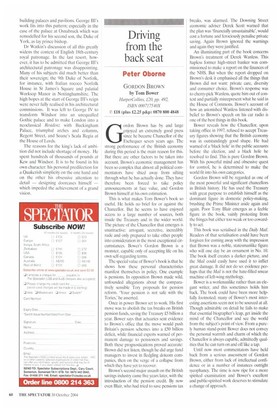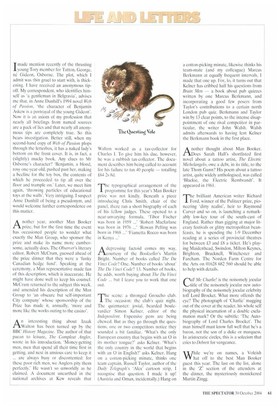Driving from the back seat
Peter Oborne
GORDON BROWN by Tom Bower
Harp erCollins, 120, pp. 492, ISBN 000717540X (r3 £18 (plus £2.25 p&p) 0870 800 4848
Gordon Brown has by and large crijoyed an extremely good press since he became Chancellor of the Exchequer seven years ago. The strong performance of the British economy during this period is the main reason for this. But there are other factors to be taken into account. Brown's economic management has been so complex that almost all political commentators have shied away from sifting through what he has actually done. They have therefore been forced to take policy announcements at face value, and Gordon Brown himself at his own estimation.
This is what makes Tom Bower's book so useful. He holds no brief for or against the Chancellor. But he seems to have enjoyed access to a large number of sources, both inside the Treasury and in the wider world. The picture of the Chancellor that emerges is unattractive: arrogant, secretive, incredibly rude and only prepared to take other people into consideration in the most exceptional circumstances. Bower's Gordon Brown is a monster, capable only of accepting life on his own self-regarding terms.
The special value of Bower's book is that he shows how these personal characteristics manifest themselves in policy. One example is pensions. In opposition Brown made wild, unfounded allegations about the comparatively sensible Tory proposals for pension reform. 'Your pension is not safe with the Tories,' he asserted.
Once in power Brown set to work. His first move was to abolish the tax breaks on British pension funds, saving the Treasury £5 billion a year. Bower says that actuaries sent evidence to Brown's office that the move would push Britain's pension schemes into a £50 billion deficit, while financial experts warned of permanent damage to pensioners and savings. Both these prognostications proved accurate: Brown did not listen, though he did urge fund managers to invest in fledgling dotcom companies, then on the verge of a collapse from which they have yet to recover.
Brown's second major assault on the British savings industry came five years later, with the introduction of the pension credit. By now even Blair, who had tried to save pensions tax breaks, was alarmed. The Downing Street economic adviser Derek Scott warned that the plan was 'financially unsustainable', would cost a fortune and ferociously penalise private saving. Again Brown ignored the warnings and again they were justified.
An illuminating part of the book concerns Brown's treatment of Derek Wanless. This hapless former high-street banker was commissioned to make a report on the finances of the NHS. But when the report dropped on Brown's desk it emphasised all the things that Brown did not want: private care, diversity and consumer choice. Brown's response was to cherry-pick Wanless, quote him out of context and partially misrepresent what he said in the House of Commons. Bower's account of how an astonished Wanless listened with disbelief to Brown's speech on his car radio is one of the best things in this book.
Bower reveals how the Chancellor, upon taking office in 1997, refused to accept Treasury figures showing that the British economy was in outstandingly good shape. He had warned of a 'black hole' in the public accounts before the election, and a black hole he resolved to find. This is pure Gordon Brown. With his powerful mind and obsessive quest for control, he is determined to make the world fit into his own categories.
Gordon Brown will be regarded as one of the most powerful and significant chancellors in British history. He has used the Treasury with great purpose to establish himself as the dominant figure in domestic policy-making, brushing the Prime Minister aside again and again. Poor Tony Blair emerges as a feeble figure in the book, vainly protesting from the fringes but either too weak or too cowardly to act.
This hook was serialised in the Daily Mail. Readers of that serialisation could have been forgiven for coming away with the impression that Brown was a noble, statesmanlike figure who will one day be an ornament in No. 10. The book itself creates a darker picture, and the Mail could easily have used it to inflict great damage. It did not do so: evidence perhaps that the Mail is not the hate-filled smear machine of left-wing mythology.
Bower is a workmanlike rather than an elegant writer, and this sometimes holds him back. The book could have been more helpfully footnoted; many of Bower's most interesting assertions seem not to be sourced at all. Though admirable on detail he fails to make that essential biographer's leap, get inside the mind of the Chancellor and see the world from the subject's point of view. From a purely human stand-point Bower does not convey the personal warmth and charm of which the Chancellor is always capable, admittedly qualities that he can turn on and off like a tap.
Until now most commentators have held back from a serious assessment of Gordon Brown, either from lack of intellectual confidence or in a number of instances outright sycophancy. The time is now ripe for a more spirited examination and Bower's excellent and public-spirited work deserves to stimulate a change of approach.
Imade mention recently of the thrusting young Tory member for Tatton, George, n(,,' Gideon, Osborne. The plot, which I admit was thin gruel to start with, is thickening. I have received an anonymous tipoff. My correspondent, who identifies himself as 'a gentleman in Belgravia', advises me that, in Anne Dunhill's 1994 novel Web of Passion, `the character of Benjamin Askew is a portrayal of the young Gideon'. Now it is an axiom of my profession that nearly all briefings from named sources are a pack of lies and that nearly all anonymous tips are completely true. So this bears investigation. Better still, when my second-hand copy of Web of Passion plops through the letterbox, it has a naked lady's bottom on the front cover. It is, in fact, a (slightly) mucky book. Any clues to Mr Osborne's character? 'Benjamin, a blond, rosy one-year-old, pushed past her, making a beeline for the toy box, the contents of which he proceeded to tip all over the floor and trample on.' Later, we meet him again, 'throwing particles of educational toys at the walls'. Very intriguing. I suspect Anne Dunhill of being a pseudonym, and would welcome further correspondence on this matter.
Another year, another Man Booker prize, but for the first time the event has occasioned people to wonder what exactly the Man Group, who sponsor the prize and make its name more cumbersome, actually does. The Observer's literary editor, Robert McCrum, guessed ahead of the prize dinner that they were a `funky Canadian hedge fund'. Speaking at the ceremony, a Man representative made fun of this description, which is inaccurate. He might have done well to keep his counsel. McCruin returned to the subject this week, and amended his description of the Man Group to an obscure but self-important City company' whose sponsorship of the Prize has made it, annually, `more and more like the works outing to the casino'.
A n interesting thing about Izaak .„Walton has been turned up by the BBC I-fishily Magazine. The author of that paean to leisure, The Compleat Angler, wrote in his introduction, `Money-getting men, men that spend all their time first in getting, and next in anxious care to keep it ... are always busy or discontented: for these poor rich men, we Anglers pity them perfectly.' He wasn't so unworldly as he claimed. A document unearthed in the national archives at Kew reveals that
Walton worked as a tax-collector for Charles 1. To give him his due, however, he was a rubbish tax-collector. The document describes him being called to account for his failure to tax 40 people — totalling £64 2s 8d.
The typographical arrangement of the programme for this year's Man Booker prize was not kindly. Beneath a piece introducing Chris Smith, chair of the panel, there ran a short biography of each of his fellow judges. These opened to a near-unvarying formula. 'Tibor Fischer was born in 1959 ..."Robert Macfarlane was born in 1976 ..."Rowan Pelling was born in 1968 ..."Fiametta Rocco was horn in Kenya ...'
depressing factoid comes my way, 'ourtesy of the Bookseller's Martin Bright. Number of books called The Da Vinci Code? One. Number of books 'about' The Da Vinci Code? 13. Number of books, he adds, worth buying about The Da Vinci Code .„ but I leave you to work that one Out.
The scene: a thronged Grouch() club. The occasion: the club's quiz night. The quizmaster: jovial, bearded boulevardier Simon Kelner, editor of the Independent. Expensive pens are being chewed. But as they go through the questions, one or two competitors notice they sounded a bit familiar. 'What's the only European country that begins with an 0 in its mother tongue?' asks Kelner. `What's the only country in the world that begins with an 0 in English'?' asks Kelner. Hang on a cotton-picking minute, thinks one team captain, Russell Taylor, author of the Daily Telegraph's 'Alex' cartoon strip, I recognise that question. I made it up! (Austria and Oman, incidentally.) Hang on
a cotton-picking minute, likewise thinks his team-mate (and my colleague) Marcus Berkmann at equally frequent intervals, I made that one up. For, lo, it turns out that Kelner has cribbed half his questions from Brain Men a book about pub quizzes written by one Marcus Berkmann, and incorporating a good few posers from Taylor's contributions to a certain north London pub quiz. Berkman') and Taylor win by 13 clear points, to the intense disappointment of one rival competitor in particular, the writer John Walsh. Walsh admits afterwards to having lent Kelner the Berkmann book in the first place.
Atother thought about Man Booker. .Does Sarah Hall's shortlisted first novel about a tattoo artist, The Electric Michelangelo, owe a debt, in its title, to the late Thom Gunn? His poem about a tattoo artist, quite widely anthologised, was called 'Blackie, the Electric Rembrandt'. It appeared in 1961.
The brilliant American writer Richard Ford, winner of the Pulitzer prize, pioneering `dirty realist', heir to Raymond Carver and so on, is launching a remarkably low-key tour of the south-cast of England. Rather than gigging at major literary festivals or glitzy metropolitan beanfeasts, he is spending the 1-9 December reading at a series of provincial theatres for between £3 and 18 a ticket. He's playing Maidenhead, Swindon, Milton Keynes, Brighton, Bracknell, Winchester and Fareham. The Norden Farm Centre for the Arts on 01628 682 560 should be able to help with details.
C11 Me Charlie! is the noisomely jocular hic of the noisomely jocular new autobiography of the noisomely jocular celebrity toff Lord Brocket. What more offends the eye'? The photograph of `Charlie' mugging out of the cover at the reader, his whole self the physical incarnation of a double exclamation mark? Or the subtitle: 'The Autobiography of Lord Charles Brocker. The man himself must know full well that he's a baron, not the son of a duke or marquess. In aristocratic circles, this is a solecism that cries to Debrett for vengeance.
While we're on names, a Voleish hat off to the best Man Booker guest this year. The last on the list, alone in the 'Z' section of the attenders at the dinner, the mysteriously monickered Martin Zingg.



















































































































 Previous page
Previous page